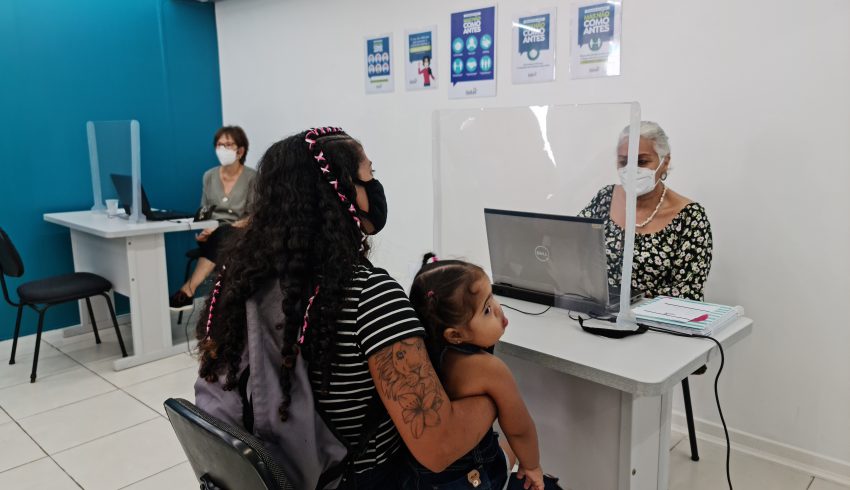The COVID-19 pandemic has had devastating impacts across the world and has been especially cruel to families in vulnerable situations. We witnessed the impact firsthand. In the first year of the pandemic, almost half of the families served at Dara had a per capita income of less than one-quarter of the minimum wage in 2020, just over R$260 (c.US$50). Even as the world virtually ground to a halt as a result of this health crisis, the immediate challenge faced by many was simply to guarantee the next meal.
Calamitous situations call for urgent, organized, and effective responses to the challenge, which the Health team at the Dara Institute almost simultaneously with the other four areas of the Family Action Plan (PAF) all had to face up to, with a particular emphasis on income. “We experienced many unusual situations that we never imagined and we were creating solutions as the problems presented themselves”, explains Sylvia Lordello, medical coordinator of Dara’s Health area.
Faced with the lockdown, one of the first measures to contain the advance of COVID-19 before vaccination, was to adapt our entire service, until then 100% in person, to a virtual one using telephone contact and messaging applications as the main tools of communication.
The COVID-19 pandemic had a devastating impact on the public health network, making Dara’s work even more important and complex. According to a survey by FGV and the Faculty of Public Health at the University of São Paulo, the focus on caring for coronavirus cases caused a bottleneck in the SUS and an overall drop in the levels of care provided.
The main demand at Dara was for medical care for sick children as the public network was overloaded caring for COVID-19 patients. Another recurring need was the purchase of medication to treat cases where monitoring at home was possible, such as pneumonia and gastroenteritis.
The impact on the public health network
– 59.7% in low and medium-complexity surgeries
– 44.7% in transplants
– 42.5% in consultations
– 42% in screening procedures
– 28.9% in diagnoses
– 27% in highly complex surgeries
– 19.1% in treatments and clinical procedures for injuries from external causes
For cases of face-to-face medical care, the Health team wrote reports and sent them, via apps, to the families. With this document, mothers who live on the other side of the Rio-Niterói bridge could travel through the lockdown to get to Hospital da Lagoa, in the South Zone, where their children could be cared for. The team took care of the entire process, even the transport, as taxis, for example, were not allowed to cross the bridge during the strictest periods of confinement.
With isolation, rising unemployment, and insecurity, there were increased reports of anxiety, depression, and other mental health issues. To help meet this demand, continuous psychological care was organized throughout the month, from only holding these sessions once a week. A total of 2,578 remote consultations were offered between March 2020 and December 31, 2020.
Hunger also affected many families during the pandemic. A survey on food insecurity carried out by the Center for Social Policies, at Fundação Getulio Vargas, measured the impact of the COVID-19 pandemic throughout the country. The number of Brazilians who did not have the money to properly feed themselves or their family jumped from 30% in 2019 to 36% in 2021, a new record since the series began in 2006, comparing Brazil with 120 other countries. Among the poorest 20%, the population suffering from food insecurity rose from 53% to 75% during the pandemic in Brazil, taking this group closer to the level seen in Zimbabwe (80%), the country with the worst index in the area surveyed.
450 families served in 2021
1,944 total beneficiaries
146 families discharged
1,008 beneficiaries under the age of 18, and 484 in early childhood
36.04% increase in average income, considering the period between arriving at and being discharged from Dara in 2021
BRL 1,504.75 average income
Of the families served at Dara, 44% had a per capita income of less than one-quarter of the minimum monthly wage in 2020, which corresponds to just over R$260 (~US$50).
In addition to increasing the amount of subsistence allowance (food card) that Dara offers to families on a monthly basis – from R$80 to R$120 in 2020 and to R$200 in 2021 – between March 2020 and September 2021, the families discharged that were reaching the end of their journey at Dara had their vouchers suspended.
We understand that the scenario was challenging and extremely uncertain. We continued to provide the support, care and guidance necessary to ensure they were ready to be discharged when their situations were more under control.
The three service centers in the Health area at the Dara Institute – Medicine, Nutrition and Psychology – in addition to the day-to-day challenges, are still dealing with the impacts and sequels left by the pandemic on the families served.
The lasting link between poverty and food insecurity
The biggest change in the profile of patients destined for the Nutrition area in the COVID-19 pandemic was the significant increase in cases of obesity, the majority of which were among women. The main causes of this were related to mental health issues such as anxiety, depression, and eating disorders, among others.
In addition to poor diet, a study by the Faculty of Public Health at USP showed that confinement and social distancing, the initial strategies used to combat the disease before mass vaccination, led to an increase in sedentary lifestyles and consumption of ultra-processed and high calorific foods. Even if there was no shortage of food, what was consumed was of low nutritional value.
For families served by Dara, the food card is an immediate way to help ensure there is food on the table. With the escalation in the price of food and cooking gas in Brazil, the nutrition team, together with families, has been struggling to meet the demands of a basic shopping list and optimize the use of cooking gas to enable healthy eating.
Of particular note related to the information worked on with the family is the importance of enjoying the food — the leaves of the vegetables, for example, are usually thrown away — being aware of the harvest months of fruits and vegetables, when these products are usually cheaper, which can be purchased at local markets at affordable prices and are high in nutritional value, as it often pays to look a little further than the best offers to find proteins at more affordable prices and avoid ultra-processed foods. The challenge is to buy healthy food in adequate amounts for what the family can afford.
A comprehensive approach to health
Most of the challenges related to food are linked to psychological issues, another area of health affected by COVID-19. A compilation of studies by the World Health Organization in 2022 showed an increase in the number of cases of anxiety, depression, and mood disorders.
In 2022, we launched a mental health program for children with support from the Care About the Children Foundation. Psychologists, pedagogues and psychopedagogues accompany the little ones during the monthly consultations with the families and, if they identify a specific need, the children are referred to the partner network, whether public or private.
For adults, Dara has a Psychology team, with psychologists, staff, volunteers, and a volunteer psychiatrist. Those who accept a follow-up — and there is a constant encouragement to do so — are assisted individually in monthly meetings.
Issues related to obesity, which is multifactorial, are being addressed within the Activation project, which we recently initiated. The aim is to fight obesity through an integrated approach to health: physical, medical, nutritional, and psychological.
At the monthly meetings, those responsible for the families served will receive psychological and nutritional support to encourage them to change their eating habits, in addition to raising awareness about the importance of regular physical activity to help ensure a better quality of life.




